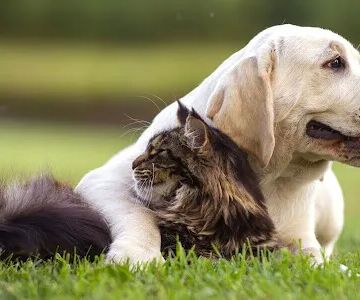Vegan and Vegetarian Diets for Pets: Benefits, Risks, and Tips
As a pet owner, I have always been mindful of the food I feed my furry companions. Over time, I've come across discussions about vegan and vegetarian diets for pets, and I began to wonder: are these diets safe and healthy for our pets? With the growing trend of plant-based eating for humans, it makes sense to wonder if the same approach could work for animals. In this article, I'll share what I’ve learned about vegan and vegetarian diets for pets, including their benefits, potential risks, and how to transition your pet to a plant-based diet safely.
1. What Are Vegan and Vegetarian Diets for Pets?
Before diving into the specifics, let’s define what vegan and vegetarian diets for pets mean. A vegan diet excludes all animal-derived products, such as meat, dairy, eggs, and even honey. On the other hand, a vegetarian diet may exclude meat but could still include animal byproducts like dairy and eggs. Many pet food companies now offer plant-based options tailored for dogs and cats, which have become more popular as pet owners seek ethical and health-conscious alternatives.
1.1 Understanding the Components of Plant-Based Pet Food
Plant-based pet foods are designed to provide all the nutrients your pet needs without animal-derived ingredients. These diets often contain a blend of vegetables, grains, legumes, and fruits. In some cases, supplements are added to ensure that the pet gets enough protein, taurine, omega-3 fatty acids, and other essential nutrients that are typically found in animal-based foods. The challenge is to find the right balance of these ingredients to keep your pet healthy and satisfied.
2. The Benefits of Vegan and Vegetarian Diets for Pets
Adopting a vegan or vegetarian diet for pets may come with several benefits, especially if your pet has allergies, sensitivities, or if you’re motivated by ethical reasons. Here are some of the most common reasons pet owners, including myself, choose to go plant-based with their pets' diets:
2.1 Ethical Reasons
For many, the primary reason for choosing a vegan or vegetarian diet for pets is ethical. As pet owners, we want to make decisions that align with our values, particularly when it comes to the treatment of animals. By feeding my pets a plant-based diet, I can feel better knowing that I am not contributing to the demand for animal farming and cruelty.
2.2 Health Benefits
Some pet owners report improvements in their pets' health after switching to a vegan or vegetarian diet. For example, some pets with food allergies or sensitivities may benefit from plant-based foods that avoid common allergens like chicken, beef, or dairy. I noticed that my dog’s coat became shinier and her digestive issues improved once I started introducing plant-based meals into her diet. However, it’s important to note that these benefits may vary depending on the pet's individual health needs and how well the diet is balanced.
2.3 Environmental Impact
As awareness grows about the environmental impact of animal agriculture, many pet owners are opting for plant-based diets for their pets as a way to reduce their ecological footprint. Plant-based diets typically require fewer resources to produce, such as water and land, compared to meat-based diets. This was an additional factor that influenced my decision to explore vegan options for my pets.
3. The Risks and Considerations of Vegan and Vegetarian Diets for Pets
While there are several benefits to vegan and vegetarian diets, it’s also crucial to understand the potential risks. One of the biggest concerns when transitioning your pet to a plant-based diet is ensuring they get the proper nutrition. Unlike humans, pets have different nutritional requirements, and a poorly balanced plant-based diet can lead to deficiencies. Here’s what you need to consider:
3.1 Protein and Nutrient Deficiencies
Dogs and cats are obligate carnivores (cats) or omnivores (dogs), which means they naturally require certain nutrients found in animal products. Without careful planning, a plant-based diet may lack essential amino acids, such as taurine and carnitine, which are found in meat. In my experience, I made sure to consult with my vet and use specially formulated plant-based pet food that includes all the necessary nutrients to prevent deficiencies.
3.2 The Need for Professional Guidance
When transitioning to a vegan or vegetarian diet, it's important to seek advice from a professional. A veterinarian with experience in plant-based diets can guide you on the right supplements and food choices for your pet. I found it incredibly helpful to work with my vet to monitor my dog’s health during the transition, ensuring she was getting enough nutrients while adapting to the new diet.
3.3 The Risk of Incomplete Diets
One common mistake that pet owners make when switching to a plant-based diet is not properly balancing the food. Incomplete or improperly balanced meals can lead to issues like weight loss, lethargy, and digestive problems. It’s essential to choose high-quality vegan or vegetarian pet food brands that are formulated to meet all of your pet’s nutritional needs.
4. How to Transition Your Pet to a Vegan or Vegetarian Diet
Transitioning your pet to a vegan or vegetarian diet requires patience and careful planning. I started by introducing small portions of plant-based food mixed with my pet’s usual food to ease the transition. Gradually, I increased the amount of plant-based food while reducing the meat-based portions. Here are some additional steps that helped me ensure the transition was smooth:
4.1 Gradual Introduction
When transitioning to a vegan or vegetarian diet, it’s important to introduce the new food gradually. I began by mixing about 25% of the new food with 75% of my pet’s usual food. Over the course of a few weeks, I gradually increased the amount of plant-based food until it made up the full meal. This slow transition helps avoid stomach upset and gives your pet’s digestive system time to adjust.
4.2 Monitor Your Pet’s Health
During the transition, it’s important to monitor your pet’s health closely. Keep an eye on their energy levels, coat condition, and digestion. If you notice any signs of weakness, weight loss, or other health issues, consult your vet immediately. Regular check-ups will help ensure your pet is thriving on their new diet.
5. Vegan and Vegetarian Food Options for Pets
As the demand for plant-based diets for pets increases, many pet food companies now offer vegan and vegetarian food options. These foods are specifically designed to meet the nutritional needs of dogs and cats. I found that some of the best options come from well-known brands that specialize in natural, plant-based foods. Many of these brands offer both dry and wet food formulas, so you can choose what works best for your pet’s preferences and needs.
5.1 Top Brands for Vegan and Vegetarian Pet Food
Some of the top brands I’ve come across for vegan and vegetarian pet food include “V-dog,” “Wild Earth,” and “Halo.” These brands offer balanced meals that are formulated to provide complete nutrition for pets on plant-based diets. I’ve found these foods to be high-quality, and my pets enjoy them just as much as their traditional meals.
5.2 Homemade Vegan and Vegetarian Meals
If you prefer, you can also prepare homemade vegan or vegetarian meals for your pet. However, this requires careful planning to ensure all nutritional needs are met. Consulting with a pet nutritionist or your vet is essential to ensure you're providing a balanced, healthy diet for your pet. Homemade meals can be an excellent option for pet owners who want more control over their pet’s diet.











